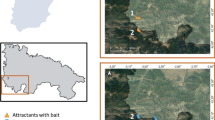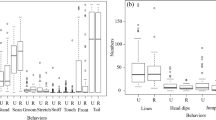Abstract
Animals of different taxa can read and respond to various human communicative signals. Such a mechanism facilitates animals to acquire social information and helps them react in a context-dependent manner. Dogs have garnered extensive attention owing to their socio-cognitive skills and remarkable sensitivity to human social cues. For example, dogs readily respond to different human pointing gestures to locate hidden food rewards. However, a general inclination towards testing highly socialized pet dogs has resulted in a dearth of information on other sub-populations of dogs. Free-ranging dogs are one of the least socialized dog populations yet exhibit point-following behaviour flexibly. As a consequence of frequent negative interspecific interactions, they are typically wary of unfamiliar humans; thus, contextual recognition of human actions is paramount for these dogs to avoid potential conflict. However, the mechanisms influencing their point-following behaviour remain unidentified. We asked to what extent the informative-deceptive nature of cues and positive human interactions influence the interspecific communicative behaviour of these minimally socialized dogs. Using a point-following experiment with a 2 × 2 design, we focused on adult free-ranging dogs’ behavioural adjustments. Dogs were randomly divided into two groups, with only one receiving brief social petting. Further, informative and deceptive cues were given to separate subsets within each group. Our findings suggest that brief social petting strongly affects the likelihood of free-ranging dogs’ point-following tendencies. Dogs who received petting followed the pointing cues regardless of their informative or deceptive nature, whereas dogs who did not receive petting discriminated between informative and deceptive pointing. This study highlights the contribution of positive human interaction and informative-deceptive quality of cues in modulating the behavioural responses of free-ranging dogs in an interspecific communicative context.


Similar content being viewed by others
References
Bates D, Mächler M, Bolker BM, Walker SC (2015) Fitting linear mixed-effects models using lme4. J Stat Softw. https://doi.org/10.18637/jss.v067.i01
Bhattacharjee D, Bhadra A (2020) Humans dominate the social interaction networks of urban free-ranging dogs in India. Front Psychol. https://doi.org/10.3389/fpsyg.2020.02153
Bhattacharjee D, Narendradev N, Gupta S et al (2017a) Free-ranging dogs show age related plasticity in their ability to follow human pointing. PLoS ONE 12:e0180643. https://doi.org/10.1371/journal.pone.0180643
Bhattacharjee D, Sau S, Das J, Bhadra A (2017b) Free-ranging dogs prefer petting over food in repeated interactions with unfamiliar humans. J Exp Biol 220:4654–4660. https://doi.org/10.1242/jeb.166371
Bhattacharjee D, Sau S, Bhadra A (2018) Free-ranging dogs understand human intentions and adjust their behavioral responses accordingly. Front Ecol Evol. https://doi.org/10.3389/fevo.2018.00232
Bhattacharjee D, Mandal S, Shit P et al (2019) Free-ranging dogs are capable of utilising complex human pointing cues. Front Psychol. https://doi.org/10.3389/fpsyg.2019.02818
Bhattacharjee D, Sarkar R, Sau S, Bhadra A (2020a) Sociability of Indian free-ranging dogs (Canis lupus familiaris) varies with human movement in urban areas. J Comp Psychol. https://doi.org/10.1037/com0000241
Bhattacharjee D, Sau S, Bhadra A (2020b) “Bolder” together — response to human social cues in groups of free-ranging dogs. Behaviour 157:363–384. https://doi.org/10.1163/1568539X-bja10005
Bräuer J, Call J, Tomasello M (2005) All great ape species follow gaze to distant locations and around barriers. J Comp Psychol 119:145–154. https://doi.org/10.1037/0735-7036.119.2.145
Bräuer J, Kaminski J, Riedel J et al (2006) Making inferences about the location of hidden food: Social dog, causal ape. J Comp Psychol 120:38–47. https://doi.org/10.1037/0735-7036.120.1.38
Bray EE, Gruen ME, Gnanadesikan GE et al (2021) Dog cognitive development: a longitudinal study across the first 2 years of life. Anim Cogn 24:311–328. https://doi.org/10.1007/s10071-020-01443-7
Brooks R, Meltzoff AN (2002) The importance of eyes: how infants interpret adult looking behavior. Dev Psychol 38:958–966. https://doi.org/10.1037//0012-1649.38.6.958
Brubaker L, Dasgupta S, Bhattacharjee D et al (2017) Differences in problem-solving between canid populations: Do domestication and lifetime experience affect persistence? Anim Cogn 20:717–723. https://doi.org/10.1007/s10071-017-1093-7
Brubaker L, Bhattacharjee D, Ghaste P et al (2019) The effects of human attentional state on canine gazing behaviour: a comparison of free-ranging, shelter, and pet dogs. Anim Cogn. https://doi.org/10.1007/s10071-019-01305-x
Bugnyar T, Stöwe M, Heinrich B (2004) Ravens, Corvus corax, follow gaze direction of humans around obstacles. Proceed Royal Soc B Biol Sci 271:1331–1336. https://doi.org/10.1098/rspb.2004.2738
Cafazzo S, Valsecchi P, Bonanni R, Natoli E (2010) Dominance in relation to age, sex, and competitive contexts in a group of free-ranging domestic dogs. Behav Ecol. https://doi.org/10.1093/beheco/arq001
Coppola CL, Grandin T, Enns RM (2006) Human interaction and cortisol: Can human contact reduce stress for shelter dogs? Physiol Behav 87:537–541. https://doi.org/10.1016/j.physbeh.2005.12.001
Dwyer C, Cole MR (2018) Domesticated dogs (Canis familiaris) tend to follow repeated deceptive human cues even when food is visible. Learn Behav 46:442–448. https://doi.org/10.3758/s13420-018-0356-8
Fitch WT, Huber L, Bugnyar T (2010) Social cognition and the evolution of language: constructing cognitive phylogenies. Neuron 65:795–814. https://doi.org/10.1016/j.neuron.2010.03.011
Freedman DG, King JA, Elliot O (1961) Critical period in the social development of dogs. Science 133:1016–1017. https://doi.org/10.1126/science.133.3457.1016
Gácsi M, Borbála G, Zsófia V et al (2009) Explaining dog wolf differences in utilizing human pointing gestures: selection for synergistic shifts in the development of some social skills. PLoS ONE 4:e6584. https://doi.org/10.1371/journal.pone.0006584
Hall NJ, Udell MAR, Dorey NR et al (2011) Megachiropteran bats (pteropus) utilize human referential stimuli to locate hidden food. J Comp Psychol 125:341–346. https://doi.org/10.1037/a0023680
Hare B, Tomasello M (2005) Human-like social skills in dogs? Trends Cognit Sci. https://doi.org/10.1016/j.tics.2005.07.003
Hartig F (2020) DHARMa: Residual diagnostics for hierarchical regression models. In: The comprehensive R archive network. http://florianhartig.github.io/DHARMa/
Hennessy MB, Morris A, Linden F (2006) Evaluation of the effects of a socialization program in a prison on behavior and pituitary–adrenal hormone levels of shelter dogs. Appl Anim Behav Sci 99:157–171. https://doi.org/10.1016/j.applanim.2005.09.011
Hughes J, Macdonald DW (2013) A review of the interactions between free-roaming domestic dogs and wildlife. Biol Conserv 157:341–351. https://doi.org/10.1016/j.biocon.2012.07.005
Jarvis T, Hall NJ (2020) Development of point following behaviors in shelter dogs. Learn Behav 48:335–343. https://doi.org/10.3758/s13420-020-00415-8
Kaminski J, Riedel J, Call J, Tomasello M (2005) Domestic goats, Capra hircus, follow gaze direction and use social cues in an object choice task. Anim Behav https://doi.org/10.1016/j.anbehav.2004.05.008
Koyasu H, Nagasawa M (2019) Recognition of directed-gaze from humans in cats. Japanese J Animal Psychol 69:27–34. https://doi.org/10.2502/janip.69.2.3
Kundey SMA, College H, Arbuthnot J et al (2010) Domesticated dogs’ (Canis familiaris) response to dishonest human points. Int J Compar Psychol 23(2):201–215
Lazzaroni M, Range F, Backes J et al (2020) The effect of domestication and experience on the social interaction of dogs and wolves with a human companion. Front Psychol. https://doi.org/10.3389/FPSYG.2020.00785
Lenth RV (2018) Emmeans: Estimated marginal means, aka least‐squares means. R package version 1.1. In: https://CRAN.R-project.org/package=emmeans. https://cran.r-project.org/web/packages/lsmeans/vignettes/using-lsmeans.pdf
Lord K, Feinstein M, Smith B, Coppinger R (2013) Variation in reproductive traits of members of the genus Canis with special attention to the domestic dog (Canis familiaris). Behavioural Processes
MacLean EL, Herrmann E, Suchindran S, Hare B (2017) Individual differences in cooperative communicative skills are more similar between dogs and humans than chimpanzees. Anim Behav 126:41–51. https://doi.org/10.1016/j.anbehav.2017.01.005
Malassis R, Delfour F (2015) Sea lions’ (Zalophus californianus) use of human pointing gestures as referential cues. Learn Behav 43:101–112. https://doi.org/10.3758/s13420-014-0165-7
Maros K, Gácsi M, Miklósi Á (2008) Comprehension of human pointing gestures in horses (Equus caballus). Anim Cogn 11:457–466. https://doi.org/10.1007/s10071-008-0136-5
Marshall-Pescini S, Rao A, Virányi Z, Range F (2017) The role of domestication and experience in “looking back” towards humans in an unsolvable task. Sci Rep. https://doi.org/10.1038/srep46636
Marshall-Pescini S, Kaminski J (2014) The Social Dog. In: The Social Dog. Elsevier, pp 3–33
Miklósi Á, Soproni K (2006) A comparative analysis of animals’ understanding of the human pointing gesture. Anim Cogn 9:81–93. https://doi.org/10.1007/s10071-005-0008-1
Miklósi Á, Topál J, Csányi V (2004) Comparative social cognition: what can dogs teach us? Anim Behav 67:995–1004. https://doi.org/10.1016/j.anbehav.2003.10.008
Morris RGM (1981) Spatial localization does not require the presence of local cues. Learn Motiv 12:239–260. https://doi.org/10.1016/0023-9690(81)90020-5
Morris D (2016) Dogwatching: The Essential Guide to Dog Behaviour, illustrate. Random House, 2016, London, UK
Nawroth C, Martin ZM, McElligott AG (2020) Goats follow human pointing gestures in an object choice task. Front Psychol. https://doi.org/10.3389/fpsyg.2020.00915
Paul M, Sen Majumder S, Sau S et al (2016) High early life mortality in free-ranging dogs is largely influenced by humans. Sci Rep 6:19641. https://doi.org/10.1038/srep19641
Petter M, Musolino E, Roberts WA, Cole M (2009) Can dogs (Canis familiaris) detect human deception? Behav Proc 82:109–118. https://doi.org/10.1016/j.beproc.2009.07.002
R Development Core Team (2015) R: A language and environment for statistical computing. R Foundation for Statistical Computing, Vienna, Austria. URL http://www.R-project.org/. R Foundation for Statistical Computing, Vienna, Austria
Range F, Virányi Z (2011) Development of gaze following abilities in wolves (Canis lupus). PLoS ONE 6:e16888. https://doi.org/10.1371/journal.pone.0016888
Rosati AG, Hare B (2009) Looking past the model species: diversity in gaze-following skills across primates. Curr Opin Neurobiol 19:45–51. https://doi.org/10.1016/j.conb.2009.03.002
Salomons H, Smith KCM, Callahan-Beckel M et al (2021) Cooperative communication with humans evolved to emerge early in domestic dogs. Curr Biol. https://doi.org/10.1016/j.cub.2021.06.051
Schaffer A, Caicoya AL, Colell M et al (2020) Gaze following in ungulates: domesticated and non-domesticated species follow the gaze of both humans and conspecifics in an experimental context. Front Psychol. https://doi.org/10.3389/fpsyg.2020.604904
Schrimpf A, Single M-S, Nawroth C (2020) Social referencing in the domestic horse. Animals 10:164. https://doi.org/10.3390/ani10010164
Sen Majumder S, Paul M, Sau S, Bhadra A (2016) Denning habits of free-ranging dogs reveal preference for human proximity. Sci Rep. https://doi.org/10.1038/srep32014
Smith BP, Litchfield CA (2010) Dingoes (Canis dingo) can use human social cues to locate hidden food. Anim Cogn 13:367–376. https://doi.org/10.1007/s10071-009-0287-z
Soproni K, Miklósi Á, Topál J, Csányi V (2001) Comprehension of human communicative signs in pet dogs (Canis familiaris). J Comp Psychol. https://doi.org/10.1037/0735-7036.115.2.122
Soproni K, Miklósi Á, Topál J, Csányi V (2002) Dogs’ (Canis familaris) responsiveness to human pointing gestures. J Comp Psychol 116:27–34. https://doi.org/10.1037/0735-7036.116.1.27
Téglás E, Gergely A, Kupán K et al (2012) Dogs’ gaze following is tuned to human communicative signals. Curr Biol 22:209–212. https://doi.org/10.1016/j.cub.2011.12.018
Udell MAR, Wynne CDL (2010) Ontogeny and phylogeny: both are essential to human-sensitive behaviour in the genus Canis. Anim Behav 79:e9–e14. https://doi.org/10.1016/j.anbehav.2009.11.033
Udell MAR, Giglio RF, Wynne CDL (2008) Domestic dogs (Canis familiaris) use human gestures but not nonhuman tokens to find hidden food. J Comp Psychol 122:84–93. https://doi.org/10.1037/0735-7036.122.1.84
Udell MAR, Dorey NR, Wynne CDL (2010a) What did domestication do to dogs? A new account of dogs’ sensitivity to human actions. Biol Rev 85:327–345. https://doi.org/10.1111/j.1469-185X.2009.00104.x
Udell MAR, Dorey NR, Wynne CDL (2010b) The performance of stray dogs (Canis familiaris) living in a shelter on human-guided object-choice tasks. Anim Behav. https://doi.org/10.1016/j.anbehav.2009.12.027
Vanak AT, Gompper ME (2010) Interference competition at the landscape level: the effect of free-ranging dogs on a native mesocarnivore. J Appl Ecol 47:1225–1232. https://doi.org/10.1111/j.1365-2664.2010.01870.x
Wynne CDL, Udell MAR, Lord KA (2008) Ontogeny’s impacts on human–dog communication. Anim Behav 76:e1–e4. https://doi.org/10.1016/j.anbehav.2008.03.010
Wynne CDL (2021) Dogs’ (Canis lupus familiaris) behavioral adaptations to a human-dominated niche: A review and novel hypothesis. In: Advances in the Study of Behavior. pp 97–162
Acknowledgements
DB and AB designed and conceived the study. DB carried out the field experiments and played the role of E; Shubhra Sau, Sudeshna Chakraborty, Rohan Sarkar, and Swapnil Bhattacharjee helped DB during the study and played the role of Eo. DB analyzed the data and wrote the first draft of the manuscript. AB edited the manuscript and supervised the work. DB was supported by a DST INSPIRE Fellowship. DB received a Developing Nations Research Grant from the Animal Behavior Society, USA, for the study. The authors would also acknowledge IISER Kolkata for providing infrastructural support for the work.
Author information
Authors and Affiliations
Corresponding author
Ethics declarations
Conflict of interest
We declare no conflict of interests.
Ethical approval
All procedures used were in accordance with the ethical standards of the Indian Institute of Science Education and Research Kolkata (approval no. 1385/ac/10/CPCSEA). All meat (raw chicken) used in the experiments were fresh and fit for human consumption.
Additional information
Publisher's Note
Springer Nature remains neutral with regard to jurisdictional claims in published maps and institutional affiliations.
Supplementary Information
Below is the link to the electronic supplementary material.
Rights and permissions
About this article
Cite this article
Bhattacharjee, D., Bhadra, A. Adjustment in the point-following behaviour of free-ranging dogs – roles of social petting and informative-deceptive nature of cues. Anim Cogn 25, 571–579 (2022). https://doi.org/10.1007/s10071-021-01573-6
Received:
Revised:
Accepted:
Published:
Issue Date:
DOI: https://doi.org/10.1007/s10071-021-01573-6




